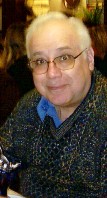Personal tools
News from ICTP 109 - Dateline

Alberto A. Colavita, long-time head of the ICTP-INFN
(Italian National Institute of Nuclear Physics) Microprocessor
Laboratory, retired in March. For the past 15 years, Colavita
coordinated several research and development projects and training
activities with international scientific organisations, universities
and industries--most notably INFN, the International School for
Advanced Studies (SISSA), the European Organization for Nuclear
Research (CERN), and the United Nations University (UNU). By giving
many scientists, mainly from developing countries, the opportunity
to conduct research in microelectronics and related fields and
to attend training courses, the Microprocessor Laboratory, under
Colavita's leadership, has helped stimulate the growth of this
research field in the South.
All in the Family
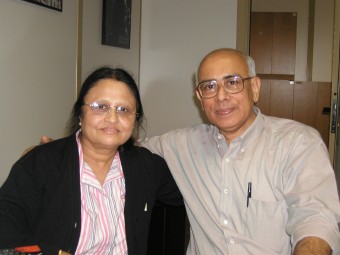
When theoretical physicists Venkataraman and Radha Balakrishnan
visited ICTP this May, it was the first time they had travelled
to the Centre together.
Both, however, had been to the Centre on numerous occasions before--individually.
Balakrishnan ('Bala' for short) works on statistical physics at
the Indian Institute of Technology, Madras. Radha specializises
in nonlinear dynamics at the Institute of Mathematical Sciences.
Both institutions are located in Chennai (formerly Madras), where
the couple has lived for nearly 25 years.
"The Centre," says Bala, who was an ICTP Regular Associate
from 1988 to 1993, "has been an important part of my career.
I first came here in 1982, and subsequently visited ICTP several
times to attend the Centre's condensed matter workshops and conferences.
I was also one of the first researchers to benefit from ICTP's
Training and Research in Italian Laboratories (TRIL) programme,
spending several months at the Politecnico di Milano in
1983 working on the mechanical behaviour of solids, my main research
interest at the time. After a hiatus of more than a decade, I
returned to the Centre in 2001 during my sabbatical year to do
research and teach statistical physics in the Diploma Course programme."
Radha has also travelled frequently to ICTP since her first visit
in 1984, often alternating trips with her husband so that one
of them could stay at home with the children. A Senior Associate
of ICTP from 1992 to 1997, she says the Centre has meant a great
deal to her career. "Not only did it allow me to keep up
with current developments in my field during the early years of
my career, but it has also led to scientific collaborations and
friendships that continue to this day. Hao Bai-Lin from China,
Rossen Dandoloff from France, and Janusz Holyst, from Poland,
are some of the physicists whom I first got to know at the Centre
and with whom I have worked."
Bala and Radha, who met at the University of Delhi as undergraduate
students and then went to Brandeis University in the United States
where they earned their doctoral degrees, collaborated and co-authored
several papers during the early years of their careers.
"I shifted fields from high energy physics to condensed matter
and many-body physics soon after earning my Ph.D. degree, largely
to work with Radha," Bala explains. "But gender barriers
contributed to our decision to ultimately pursue separate career
tracks," says Radha. "I'd often be asked how much of
the joint work was 'really' mine. To ensure that I would be accepted
as a researcher in my own right, I decided to move into the sub-field
of nonlinear dynamics, which was really gaining momentum at the
time."
Today, with their children grown (their son recently became a
tenured associate professor at the Massachusetts Institute of
Technology and their daughter is a doctoral student at Stanford
University), Bala and Radha now have the freedom to travel to
Trieste together--each, on their own, having been part of ICTP's
extended family for many years.
Director Meets President of Iran
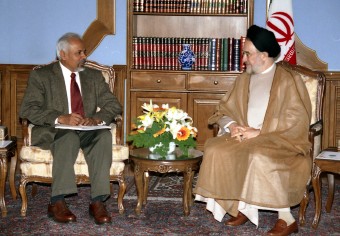
Mohammad Khatami, President of Iran, met with ICTP's director,
Katepalli R. Sreenivasan on 13 May. The meeting, which
took place at President Khatami's office in Tehran, was attended
by Reza Mansouri, Deputy Minister for Research Affairs
in the Ministry of Science, Research and Technology (and former
ICTP Associate 1988-1994); Seifallah Randjbar-Daemi, head
of ICTP's High Energy Physics group; and Giuliano F. Panza,
head of ICTP's Structure and Non-Linear Dynamics of the Earth
(SAND) group. President Khatami graciously acknowledged the value
of ICTP and its work and expressed his appreciation for the Centre's
contribution to science in Iran. During his week-long trip, the
Director also addressed a meeting of Iran's university presidents
and travelled to Sri Lanka where he met with ICTP Associates and
officials at the Centre for Graduate Studies in Peradenya.
IAMP to Trieste
The secretariat of the InterAcademy Medical Panel (IAMP), a group of 45 medical academies or medical divisions within national science academies, will move to Trieste from the US National Institutes of Health this autumn. Guy de The, cochair of IAMP, made the announcement at a news conference held on 19 May at ICTP. IAMP will be located on the 7th floor of the Adriatico Guesthouse and will operate under the administrative umbrella of the Third World Academy of Sciences (TWAS). For additional information, see www.interacademies.net.
Academy Honours and Prizes
Several scientists closely associated with ICTP have recently received prestigious awards and honours.
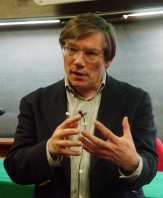
Alan Guth, Massachusetts Institute of Technology, and
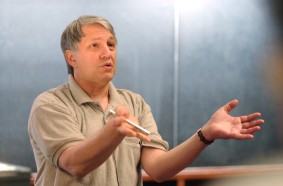
Andrei Linde, Stanford University, have won the Peter Gruber Foundation's Cosmology Prize 2004 for their core contributions to the theory of cosmic inflation. They will receive US$100,000 each. Guth and Linde, co-recipients of the Dirac Medal in 2002, have visited the Centre on numerous occasions (see "Universal Inflation," News from ICTP, Summer 2003).
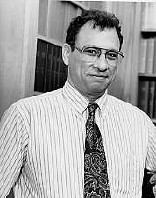
Simon Levin, who has participated in ICTP courses on mathematical ecology since the mid-1980s, has been awarded The Royal Netherlands Academy of Arts and Sciences A.H. Heineken Prize for Environmental Sciences 2004 for his insights into the effect of scale on ecosystems. The prize includes a cheque for US$150,000 (see "When Math Meets Ecology," News from ICTP, Spring 2000).
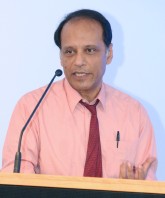
Sir Partha Dasgupta, professor of economics at the University of Cambridge, UK, and co-director of the ICTP-hosted Ecological and Environmental Economics programme, has been elected a Fellow of the Royal Society. The Society honoured Dasgupta for his "uniquely outstanding contributions to environmental biology and ecology." (see "Valuing Nature through Science," News from ICTP, Summer 2002).
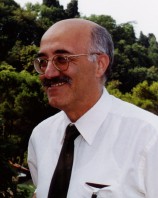
The Royal Society also elected Michele Parrinello, Swiss Federal Institute of Technology, Lugano, Switzerland, a foreign member. Parrinello is being honoured for "his contributions to computer simulation methodologies and algorithms that have had a major impact in the physical sciences." In the 1980s, Parrinello spent several years in Trieste working for both SISSA and ICTP (see "Models of Behaviour," News from ICTP, Autumn 2003).
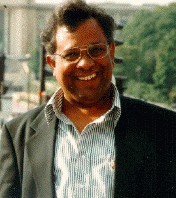
Padma Kant Shukla, world-renowned expert in theoretical
plasma physics, who has visited the Centre on numerous occasions
and most recently has served as course director of the Workshop
on Theoretical Plasma Physics, has been awarded an honorary doctorate
in sciences by the Russian Academy of Sciences.
In the Net
Romualdo Pastor Satorras, Universitat Politecnica de Catalunya, Barcelona, Spain, and Alessandro Vespignani, Universite de Paris XI (Paris-Sud), Orsay, France, have recently coauthored The Evolution and Structure of the Internet: A Statistical Physics Approach (Cambridge University Press). Vespignani was a research scientist with the Condensed Matter Physics group for five years and Pastor-Satorras was an ICTP postdoctoral student for two years. Their collaboration on the book began in 2001 when they were both at ICTP.
ICTP Welcomes Iraqi Scientists
UN sanctions against Iraq have been lifted. ICTP may now accept applications from Iraqi scientists interested in attending Centre research and training activities. The sanctions had been in place since 1991.
